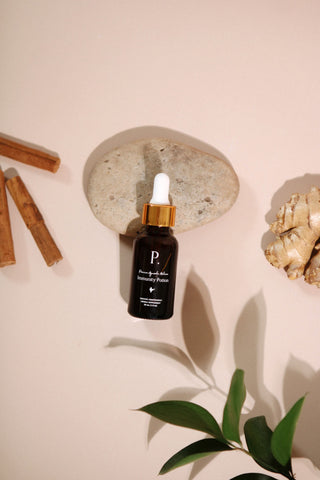Nothing beats the warm smell of cinnamon wafting through the house. While every kitchen has cinnamon on the spice rack, not all cinnamon is created equal. In fact, did you know that there are two main species of cinnamon with different health benefits and risk factors? Chances are, the jar of cinnamon in your kitchen is not the best kind for you. At Potion, we believe in using the best cinnamon in our blend of ingredients.
Trees in the genus “Cinnamomum” are responsible for producing the tasty spice we are familiar with. There are two main species of cinnamon that are associated with commercial use: Ceylon and cassia cinnamon. “Cinnamomum verum,” commonly known as Ceylon cinnamon originates in Sri Lanka and is often referred to as “true cinnamon.” Ceylon cinnamon has a light, soft texture with a mild flavor, and is typically harder to find and more expensive. This is what we use in Immunity Potion due to its numerous health benefits.
However, most international commerce and grocery chains carry the other species of cinnamon commonly known as cassia cinnamon, sometimes referred to as “Chinese cinnamon” due to its origins in China. Cassia cinnamon is grown in East Asia, is dark and rough with a strong flavor, and is considered to be of lower quality than its counterpart, Ceylon cinnamon. This is the type of cinnamon you most likely have in your own kitchen.
Does the type of cinnamon you consume affect your health? The short answer is – yes! That’s why at Potion, we take care to incorporate the right herbs that help your body heal naturally.

Cassia Cinnamon Side Effects
If you keep ground cinnamon stocked in your kitchen, chances are it is cassia cinnamon. The primary difference between cassia and Ceylon cinnamon is that cassia contains a chemical called coumarin, which can have significant effects on health when used in large amounts. While many foods contain coumarin in small amounts, cassia cinnamon is the most concentrated source of coumarin, unlike Ceylon cinnamon which has next to none of the toxic chemical. Several countries have restricted the use of cassia cinnamon because of these potential health hazards linked with coumarin [1].
Some of the side effects related to high doses of cassia cinnamon and coumarin include:
Liver Damage
One of the main concerns with coumarin is the potential for it to cause liver damage. It has been shown to produce organ tumors in rats and mice, specifically in the liver, heart, and lungs. Other studies on coumarin exposure in humans have shown it to damage liver function [2].
Potential Promotion of Cancer Cells
While there are limited studies on adverse coumarin effects in humans, some animal studies indicate that the chemical may lead to cancer development [3].
Hindering Cognitive Development
Research has shown that fetal exposure to coumarin may be linked to cognitive development, leading to neurological problems later. A study in “Early Human Development” on school-aged children showed that exposure to coumarin in utero, especially during the second and third trimester, created a 90% increased chance of neurological dysfunction [4]
Short Term Side Effects
Many people who consume coumarin sources report that they experience side effects such as blurred vision, nausea, diarrhea, or headaches. These usually resolve on their own but are unpleasant to experience and can interfere with daily life.
Why Use Ceylon?
Regularly adding Ceylon cinnamon to your diet can be a great way to up-level your health. It doesn’t just taste amazing; it also carries a host of health benefits! Some of these include:
Lower Blood Pressure
Cinnamon has been linked to reduced blood sugar levels [5] and can also increase the amount of good cholesterol in our blood.
Diabetes Control
In relation to lowering blood pressure, Ceylon cinnamon has been evaluated as being useful as a pharmaceutical agent in patients with T2 diabetes through increasing insulin sensitivity and reducing blood sugar levels [6]. A 2016 published study assigned diabetic patients to take 1 gram of cinnamon a day for 12 weeks. The study demonstrated a reduction of blood glucose among the T2 patients, and recommends Ceylon as the most potent inhibitor [7].
Antimicrobial Properties
Ceylon cinnamon is rich in antioxidants, which provide an anti-inflammatory effect and rid your body of unwanted toxins. Cinnamon has even been shown to fight against oral pathogens that cause dental problems [8].
At Potion, we use Ceylon cinnamon in our unique herbal blend to provide you with the best tools for keeping your body healthy and whole. We’re invested in you, and that’s why we bring you the right ingredients, in the right quantities, and extracted the right way.








